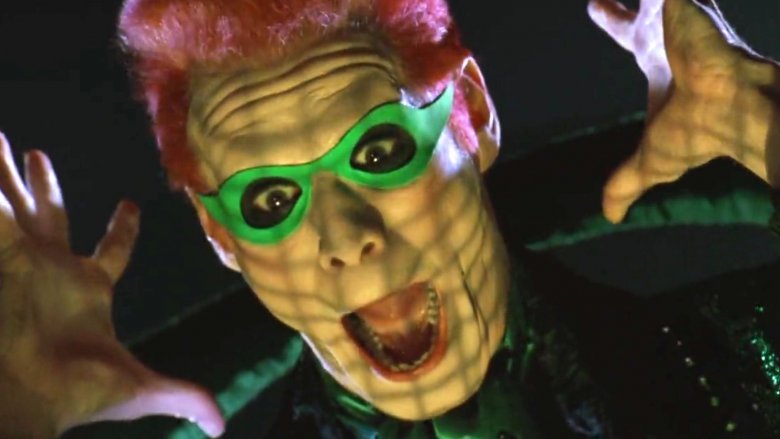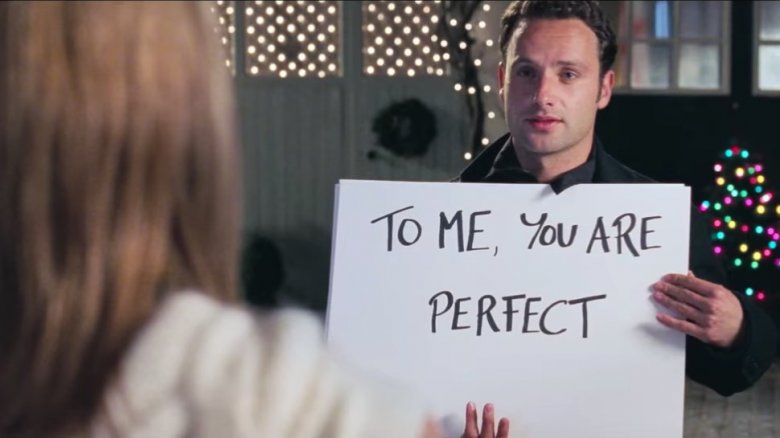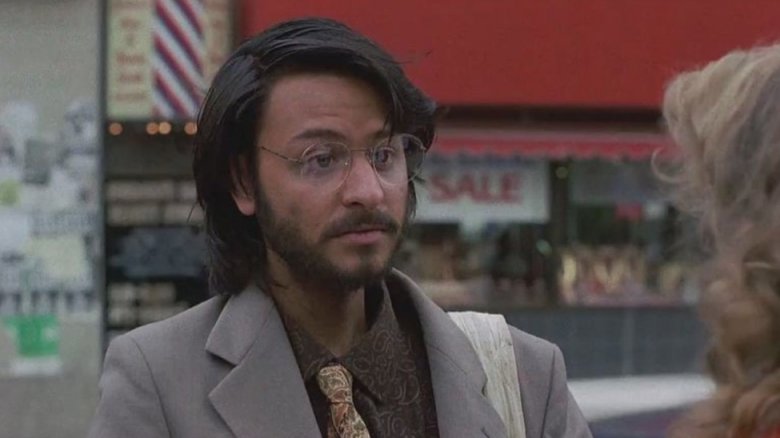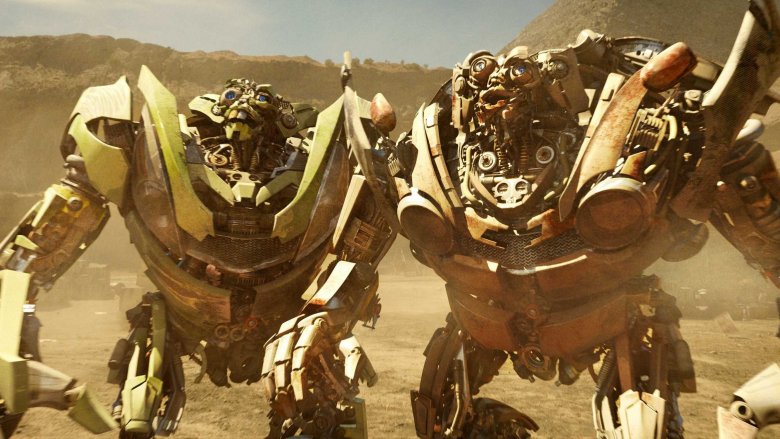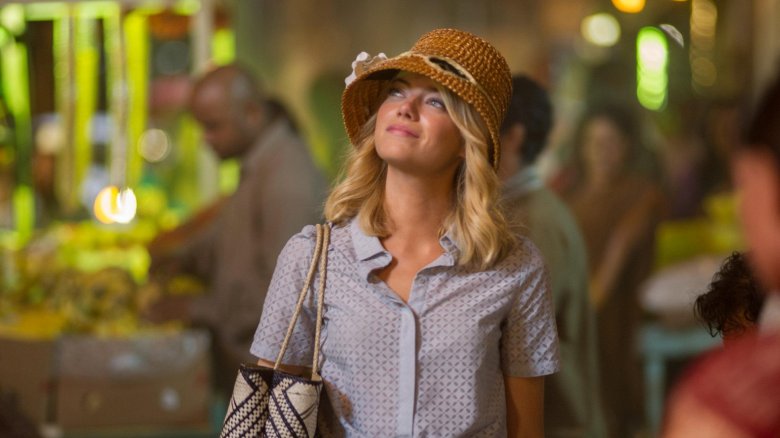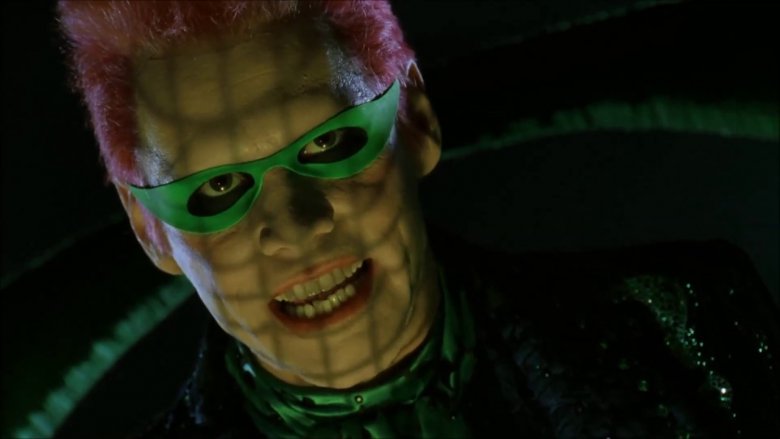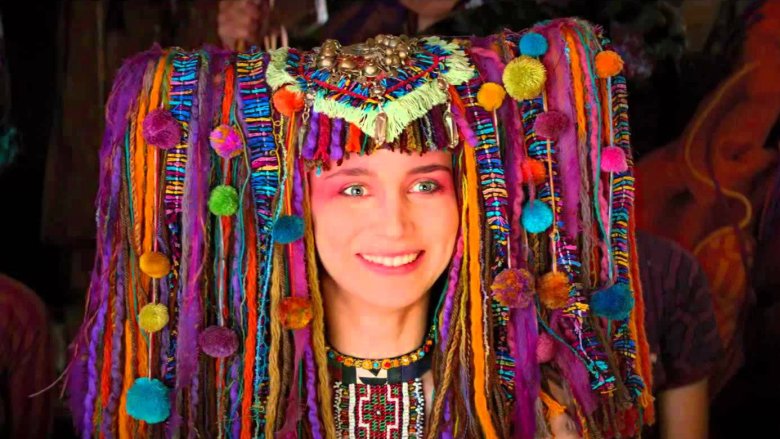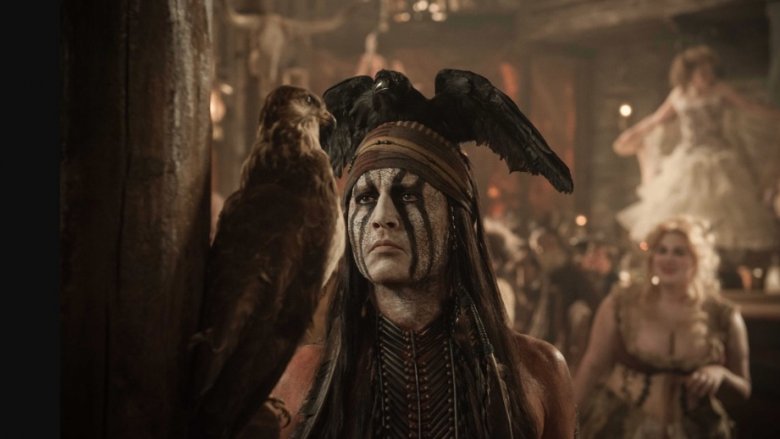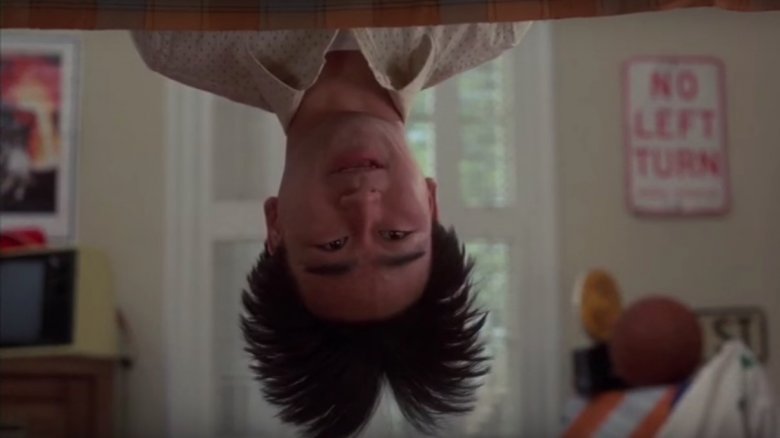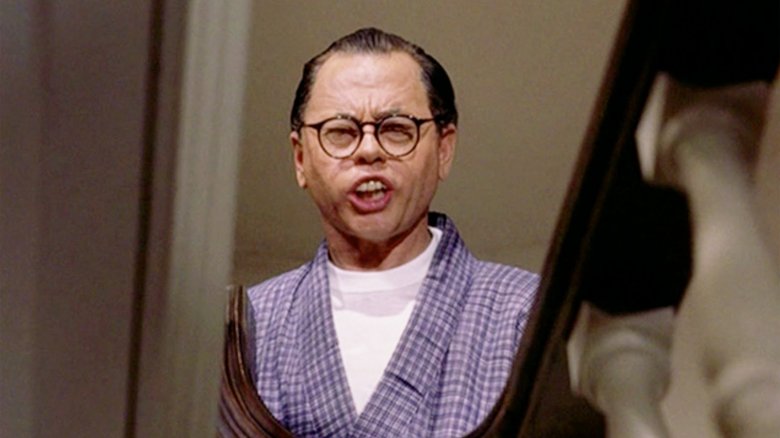Characters That Almost Single-Handedly Ruined A Movie
One of the great joys of cinema is getting to see minor characters steal a film with their presence. From Tiffany Haddish's Dina in Girls Trip to Sam Rockwell in pretty much everything, it only takes one incredible character to turn a good film into a classic.
Unfortunately, the opposite can also be the case. When the audience is distracted by a character's antics, it probably won't translate to critical praise or audience adoration — it usually just means the character is annoying. Worst is when a character is so egregiously terrible that their sheer presence on screen ruins the entire movie. No matter how many wonderful qualities a film might have, it only takes one truly abhorrent character to completely ruin it for some viewers. From racist robot caricatures to the worst best friend ever, here's a look at some of the characters that have almost single-handedly ruined a movie.
Signs of a creepy stalker
There are so many different plots in Love, Actually that it's easy to forget how weird some of the "love" stories actually are. While it would be easy to talk about the film's more problematic elements, like Hugh Grant's Prime Minister flirting with an intern, there's only one truly ruinous character in the film: Andrew Lincoln's Mark, who decides that the best time to confess his feelings to his true love is literally weeks after she marries his best friend.
You may remember this famous scene, in which Mark swings by on Christmas Eve to show Juliet a series of signs that illustrate his love. There are a few big problems with this, but the biggest is that Juliet is newly married and one of the first things Mark does is ask her to lie about who's at the door. Right at the very beginning of what should be some of the happiest weeks of her life, Juliet has to keep a massive secret from her new husband or risk emotionally destroying him. While many of the stories in Love, Actually are pretty sweet, this is the only one that is more like "Love? Actually, no." Even Lincoln himself agrees that his character was terrible, later saying that "The story is set up like a prism looking at all the different qualities of love. Mine was unrequited. So I got to be this weird stalker guy." Andrew, we couldn't agree more.
Does not compute
The '80s were a magical decade for movies starring robots. From the cyborg menace in The Terminator to Paulie's robot maid in Rocky IV, mechanical characters were everywhere. The rise of robot actors might have been the genesis for Short Circuit, a film about a robot that achieves sentience after getting struck by lightning. It's a solid premise, but these days it's probably better known for Fisher Stevens' outrageously racist Indian stereotype as Ben Jabituya (changed to Ben Jahveri for Short Circuit 2).
Stevens darkened his skin, put in dark contact lenses, and adopted an over-the-top accent to play the scientist. It's a deeply uncomfortable character, and his presence on the set of an otherwise family-friendly movie is incredibly distracting. Even worse, Stevens' character goes from supporting in the first movie to the lead in Short Circuit 2. Stevens would eventually acknowledge the character as a mistake, and clarifiy that he wouldn't have taken the role as an older and presumably wiser actor.
More racist stereotypes than meet the eye
Michael Bay's Transformers franchise has taken a lot of heat from critics, for a variety of reasons. The second installment in the franchise, Transformers: Revenge of the Fallen, features Skids and Mudflap, a pair of Transformers so egregiously racist that nearly every review called out their presence as a low point in a film series that was already critically disliked.
Skids and Mudflap are robot brothers who fight constantly, admit that they can't read, and speak in an exaggerated, rap-inspired street slang. Even the designs are upsettingly coded, with Skids sporting buck teeth and a gold tooth. Regardless of whether you enjoy Bay's frenetic action sequences and music-video-style editing, it's almost impossible to watch Transformers: Revenge of the Fallen without wincing every time Skids and Mudflap strike a b-boy pose on the screen. Even the screenwriters were embarrassed about the way the robots ended up looking and sounding on the screen. Writer Alex Kurtzman responded to the controversy by saying, "It's really hard for us to sit here and try to justify it."
Uh, no. Ha.
Emma Stone is easily one of Hollywood's most talented leading ladies. She combines an unmistakable acting talent with savvy decision-making about which directors to work with, so it's no surprise that she thought it would be a good career move to work with Cameron Crowe, the seasoned director behind Almost Famous and Jerry Maguire. Unfortunately, in Crowe's Aloha, Stone was cast as Allison Ng, a fighter pilot of Chinese and Hawaiian descent.
Emma Stone, as you might have guessed, is neither Chinese nor Hawaiian, which makes it nearly impossible to watch the film without remembering the long history of whitewashing in Hollywood. Crowe eventually apologized for the casting decision, while Stone said she became "the butt of many jokes" because of the role. While the casting decision might have been hard on Stone on a personal level, it had to be much harder on the viewers who had to endure yet another whitewashed film.
Unsanctioned buffoonery
Working with the right director on the right project, Jim Carrey can turn in a truly great performance. From The Truman Show to Eternal Sunshine of the Spotless Mind, Carrey has proven himself adept at showcasing a vulnerability that his more cartoonish roles lack. Unfortunately, it doesn't seem like Joel Schumacher was the right director, and Carrey's role as the Riddler in Batman Forever was definitely the wrong project.
Carrey's cartoonishness is dialed up to 11 in the film. He springs around the set and screams his lines at odd frequencies like a sugar-addicted grade schooler. Even if Batman Forever has more of a manic energy than the earlier Tim Burton films or the later Christopher Nolan movies, this iteration of the Riddler was so annoying that even co-star Tommy Lee Jones couldn't deal with it. In Carrey's own words, when he tried talking to Jones, his co-star made his feelings clear. "He said, 'I hate you. I really don't like you,'" Carrey recalled. "'I cannot sanction your buffoonery.'" Neither can anyone who watches this movie.
Pan, panned
Tiger Lily and the presentation of Native Americans in Neverland has always been an issue in Peter Pan adaptations — even in the beloved Disney version, there's an entire musical number based almost completely on Native American stereotypes. Still, while past adaptations have always made a mess of that particular plot element, 2015's Pan might take the cake for its tone-deaf approach.
To fill the part of Tiger Lily, director Joe Wright hired Rooney Mara, a definitively white actress, and then ignore that Tiger Lily had ever been a Native American character. Despite some interesting casting choices, like Hugh Jackman as the evil pirate Blackbeard, Pan turned out to be a bomb at the box office, arguably due in part to the whitewashing controversy. It's hard to see any of the film's positive qualities when Mara is playing a character more "lily white" than Tiger Lily. To her credit, Mara later apologized, saying, "I understand the anger about whitewashing. I completely do, and I agree with it."
Bad idea, kemo sabe
While it was good of Rooney Mara to apologize for playing a Native American character when she wasn't actually Native American, you'd think she would have already known what a terrible idea that was. After all, Johnny Depp provided an example just two years earlier when he played Tonto in 2013's The Lone Ranger. Despite director Gore Verbinski's skill with large-scale set pieces and tight camera work, the movie can't escape the discomfort of watching Depp walk around like a grotesque parody of Native Americans.
In fact, Depp's Tonto looks more like Edward Scissorhands than any past interpretation of Tonto. It's hard to become invested in the runaway train climax when Tonto is wearing a dead bird on his head and speaking in the same clipped speech patterns that Hollywood has been using for Native Americans for decades.
Sixteen Candles, one offensive character
John Hughes was the king of teenager-focused comedies in the 80s, beating the box office with Pretty in Pink, The Breakfast Club, and Sixteen Candles, to name just a few. His films are often heralded as classics, and a lot of the naturalistic dialogue in Pretty in Pink and The Breakfast Club holds up today. Unfortunately, the character of Long Duk Dong in Sixteen Candles definitely does not. In fairness, the character is actually played by an Asian-American actor, Gedde Watanabe. Nonetheless, everything else about Long Duk Dong, and the humor surrounding him, is atrocious.
From jokes about how his name sounds like slang for "penis" to the egregious use of a gong sound to herald his arrival, Watanabe's scenes in Sixteen Candles are virtually unwatchable as anything more than a cautionary tale for modern audiences. The worst part is how pervasive the character is; as soon as you start caring about Sam's birthday blues, there's Dong falling out of a tree on top of a woman while yelling "Oh, sexy girlfriend."
And I said, 'What about fast forwarding through Mickey Rooney's parts'
Breakfast at Tiffany's is a classic film. Starring Audrey Hepburn at the height of her gamine appeal and based on the bestselling novella by Truman Capote, Tiffany's is a favorite for film snobs and mainstream audiences alike — which makes it that much worse that its legacy is tainted by Mickey Rooney's performance as a Japanese man named Mr. Yunioshi, complete with caricatured makeup and buck teeth.
Every single time the character is onscreen, it's an agonizing reminder of how blatantly racist Hollywood can be — made even worse by the fact that the character from the original novella bears almost no resemblance to Rooney's outrageous caricature. It's almost impossible to slip back into the romantic comedy of the film after a scene featuring Rooney in yellowface makeup. It's an ugly sight, and one that's only gotten harder to watch with time.
